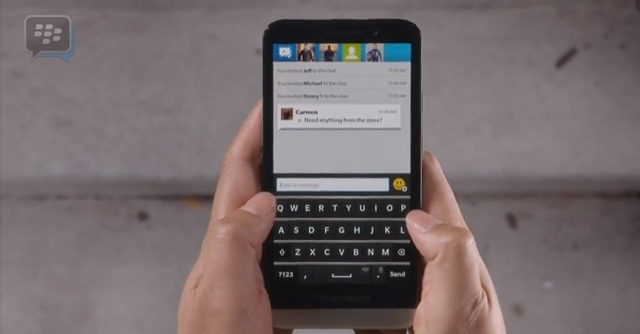
Following the departure of Thorsten Heins and the arrival of interim CEO John Chen, BlackBerry has refocused on its enterprise strategy. Chen stated as much in a recent open letter, claiming that the company would be “going back to our heritage and roots,” and backing it up with the recent hiring of John Sims as President of Global Enterprise Services. Today, BlackBerry issued a release highlighting BBM’s use as an effective enterprise tool, stating that 85 percent of BlackBerry Enterprise Server (BES) enabled organizations are using BBM as an end-to-end communications solution.
An 85 percent penetration rate sounds impressive but requires a bit more context. BlackBerry claims to have over 28,000 BES10 servers installed globally, servicing 3.8M users and about 60% of all North American and Western Europe enterprises, which is a broad base of potential BBM users. However, a spokesperson at BlackBerry confirmed the 85 percent statistic refers to “organizations running BES who show employees passing data across BBM over the BES,” meaning it can includes both company-wide deployments and a few employees sending emoticons back and forth. So the amount of mind share BBM maintains in the enterprise space is still a bit murky.
Enterprise-focused features will aid corporate penetration and lock-in. In addition to its collaboration options (group chats, private BBM channels, voice calls and screen sharing, etc.), BlackBerry is pushing BBM’s data security and ability to log, archive, and audit conversations to meet industry-based compliance requirements as major selling points. But the ongoing disruption caused by freemium SAS offerings like Dropbox and Google Apps show that the enterprise services which stick are the ones that are easy to use; for a communications app like BBM that means knowing you can actually reach your co-worker when you need to send a message.
We asked BlackBerry if they had any plans to improve BBM’s friend discovery issues by allowing IT admins to link BBM accounts to their company’s Global Address List, meaning employees could quickly find BBM contacts and message them through a simple name search similar to enterprise email. BlackBerry’s spokesperson indicated the feature was an example of the type of enhancements it is looking to add around user management and directory integration but doesn’t yet have.
Let’s hope it’s at the top of the list. Until then, you can check out some BBM features coming in 2014 that BlackBerry has announced.
[source]MarketWired[/source]
MobileSyrup may earn a commission from purchases made via our links, which helps fund the journalism we provide free on our website. These links do not influence our editorial content. Support us here.


